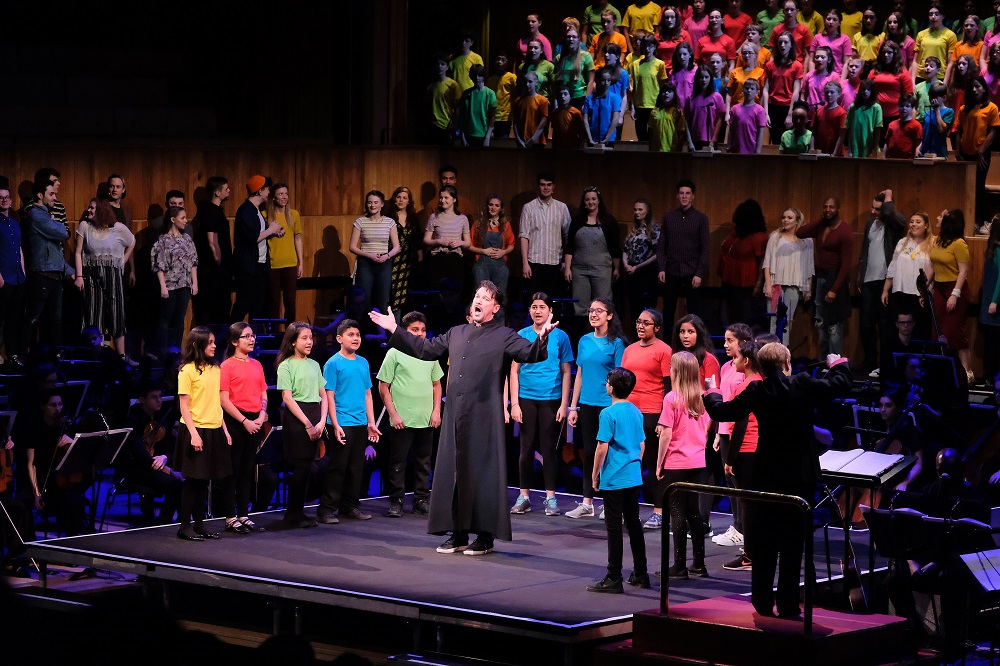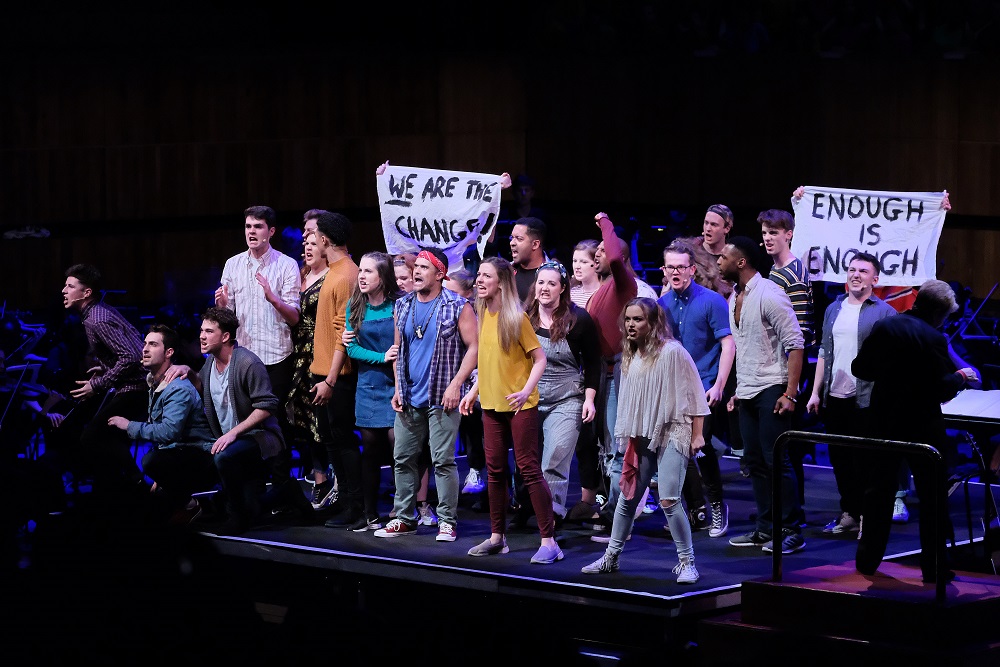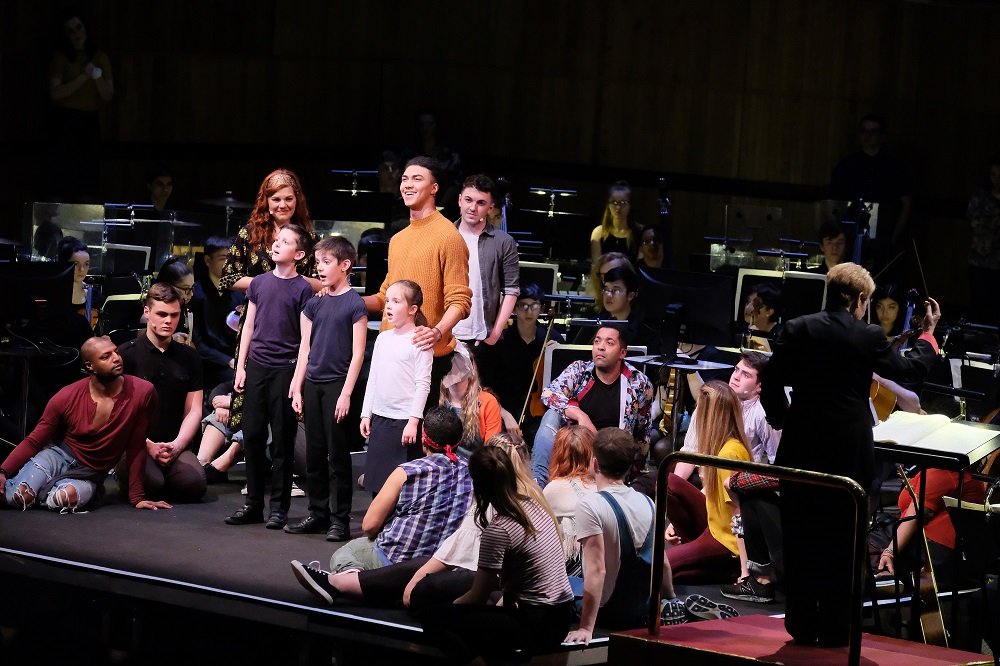Bernstein's MASS, RFH review - polymorphousness in excelsis | reviews, news & interviews
Bernstein's MASS, RFH review - polymorphousness in excelsis
Bernstein's MASS, RFH review - polymorphousness in excelsis
Vibrant diversity in this ever-topical 'theatre piece for singers, players and dancers'
Live exposure to centenary composer Leonard Bernstein's anything-goes monsterpiece of 1971, as with Britten's War Requiem of the previous decade, probably shouldn't happen more than once every ten years, if only because each performance has to be truly special.
Now, it seems, the world as a whole is closer to the collective breakdown characterised by Bernstein's constantly widening rift between the Latin words of the Christian Mass - many of them pre-recorded, in quadraphonic sound at the premiere - and the vernacular response which ranges from the desperate will to believe through cynicism and anger to rejection. Should it be an entirely American issue? As before, Kelly gives us images from the time of hope in JFK onwards, stylishly incorporated on screen canvasses by designer Michael Vale. They bring us as up to the minute as we can get; there is sight for one moment of the American Horror-Clown in Chief as the visuals rapidly fast-forward, and it is meant to pierce us, just when the crisis reaches its overwhelming zenith (caution: ear plugs needed, if only for three minutes). 
This time the colossal role of the Celebrant, worn down by confrontational questioning to a tricky 14-minute nervous breakdown Bernstein calls “Fraction" and which surely owes something to Peter Grimes' mad scene, is taken by Paulo Szot (pictured above centre), born in Brazil to Polish émigré parents. He has what the part takes but rarely gets: an operatic baritone of warmth and power matched to the natural intensity of a show singer (his award-winning performance in South Pacific on Broadway really put him on the American map; he's found more often today singing Mozart). Rightly the vociferous-at-the-end but attentive audience reflecting the diversity on stage – where the National Youth Orchestra of Great Britain shared desks with players from the junior division of Chineke!, the pioneer of Black and Minority Ethnic (BME) players in classical music – went wildest for him. 
Among the 500 performers, also including spirited diverse choirs coached by the now-ubiquitous Mary King, the dancers probably had the least good deal: their routines don’t chime with the very non-dancey orchestral interludes, where you really wanted to concentrate on the faces of the young players instead. But there was some deep and impassioned string playing – not easy for half the orchestra to see Alsop on the other side of the stage when visually blocked by the Street People on the central platform – and from the bluesy “voice from heaven” of the flutes in the initial “Simple Song” to the clarinets keeping the lonely Celebrant company, the woodwind playing always impressed. 
rating
Share this article
Add comment
The future of Arts Journalism
You can stop theartsdesk.com closing!
We urgently need financing to survive. Our fundraising drive has thus far raised £49,000 but we need to reach £100,000 or we will be forced to close. Please contribute here: https://gofund.me/c3f6033d
And if you can forward this information to anyone who might assist, we’d be grateful.

Subscribe to theartsdesk.com
Thank you for continuing to read our work on theartsdesk.com. For unlimited access to every article in its entirety, including our archive of more than 15,000 pieces, we're asking for £5 per month or £40 per year. We feel it's a very good deal, and hope you do too.
To take a subscription now simply click here.
And if you're looking for that extra gift for a friend or family member, why not treat them to a theartsdesk.com gift subscription?

Comments
It's a flawed piece for sure
I'm slightly perplexed why
I'm slightly perplexed why anyone should think the ideas dated in any way - I can see why a handful of the many musical styles might feel that way. But as a reflection on a crisis of faith, with a small or large f, religious or secular, it surely speaks to us all.And the work itself challenges the uprisings as a possible source of another conflagration in that massive, noisy climax - it keeps things ambiguous. As I wrote, my one concern might be that Jude Kelly kept it 'about' America - I imagine if Graham Vick had tackled it in Birmingham, he'd use it to take on the whole world.